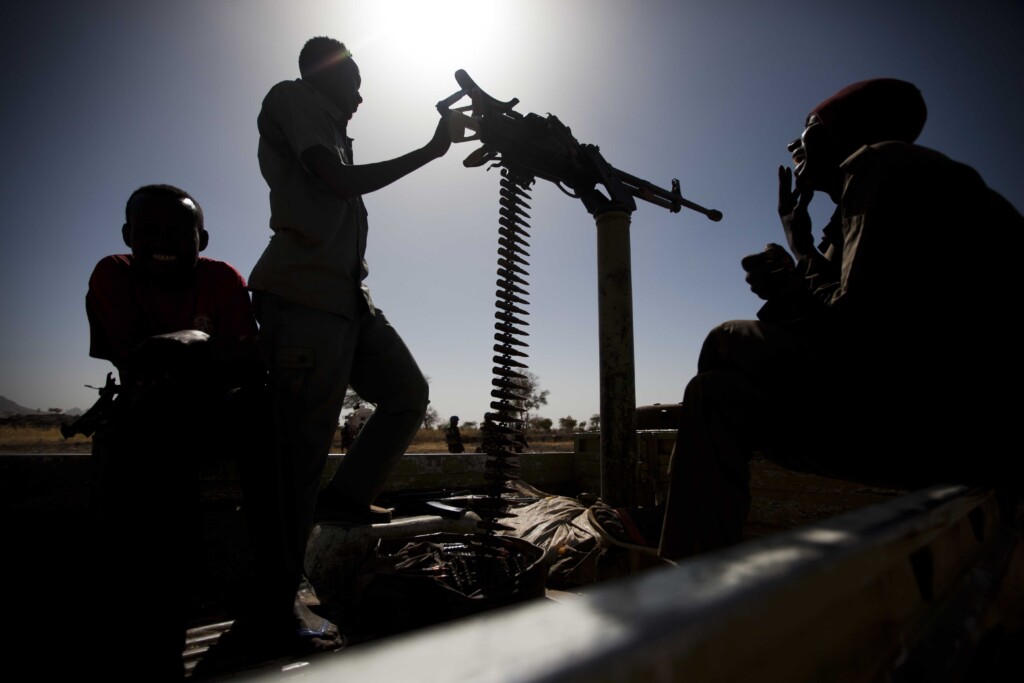RSF ‘liberates’ vital Sudan oilfield

Combatants in Sudan on a vehicle mounted with a 'dushka' .50-cal machinegun (File photo: Albert Gonzalez Farran / UNAMID)
The paramilitary Rapid Support Forces (RSF) launched an attack on the Balila oilfield, as well as the Balila Airport in Sudan’s West Kordofan, earlier today. In a statement by the RSF’s official spokesperson, they claim to have “liberated the airport” and “inflicted heavy losses, in both lives and equipment” on the Sudan Armed Forces (SAF).
Their statement goes to say that they were able to seize 15 military vehicles, including a number mounted with ‘dushka’.50-cal machine guns, as well as four mounted with dual cannons. According to the statement, they add that they also torched three armoured vehicles and captured large quantities of weapons and ammunition.
The RSF also hurled accusations at the SAF in their statement, saying that after repelling most of the SAF, some of their forces stayed behind to “burn the entire airport and systematically destroy all facilities”.
Unconfirmed eyewitness testimonies contradicted the RSF’s accounts, stating that the SAF shelled the RSF that attacked the fields, causing them to withdraw. Due to the developing nature of this story, it is not possible to verify this information.
A source working in the Balila oilfield, told Radio Dabanga that the oil company pre-empted the attack, and evacuated all crews from the field to the nearby city of El Fula, capital of West Kordofan, yesterday evening.
According to the field worker, they initially received orders to evacuate Balila on Saturday evening. However, uncertainty arose due to the delayed updates on the Civil Administration’s efforts to halt the RSF attack, leading to the evacuation being delayed till the following evening.
Workers state that the RSF that attacked the fields, came from the area of Abu Zabad.
Oil production
Fears mount as nearby oil subfields risk RSF control, with Balila oilfield already being one of Khartoum’s primary upstream feeders. This potential shift might cripple the SAF’s fuel access, potentially triggering a national crisis.
Balila Airport is also a potentially lucrative and strategic outpost for the RSF, as it can be used to receive external supplies, as an alternative to Nyala Airport.
Before war broke out between the SAF and RSF, the Balila oilfields were a regular target for various armed groups.
Last year, Radio Dabanga reported that armed men launched rocket and grenade attacks on the field, as well as intimidating workers with leaflets reading “leave with your family before you perish”.
The field is run as a joint venture between Sudan and China, housing approximately 1.3 million barrels of heavy crude, and supplying Khartoum’s vital oil refinery.
Engineers in the oilfield state that abrupt halts lead to losses from crude freezing in pumps and pipelines. Balila is reported to produce nearly seventy-thousand barrels daily, however, due to the war output has significantly dipped.
Many people in the surrounding area have complained over the lack of work opportunities for locals and the disparity in profit for the manufacturers and investment locally.
The secession of South Sudan in 2011 resulted in a two-thirds loss of Sudan’s oil production. Reports indicate an agreement between the South Sudanese government and the RSF took place to ensure the uninterrupted flow of South Sudanese oil exports via the Red Sea, crucial for the nation’s economy during wartime.
RSF take-over
This report follows news of last week’s RSF take-over of the major SAF 16th Infantry Division base in Nyala, capital of South Darfur, following a fierce three-day clash.
On Friday, RSF Deputy Commander Abdelrahim Dagalo, brother of RSF Commander ‘Hemedti’, called on the people in Nyala to return to their homes, however many in northern Nyala are reported to have fled the city since the RSF took control.
Nyala Police Chief Maj Bashir Eisa directed prosecutors to secure the people’s safety and resume basic services, including the opening of markets and hospitals.
A medical source working for the Department of Accidents, Surgery and Operations at the El Wehda Hospital in Nyala South, told Radio Dabanga yesterday that 15 people were killed and 156 others were injured by the SAF-RSF battles for Nyala between September 29 and October 28.








 and then
and then